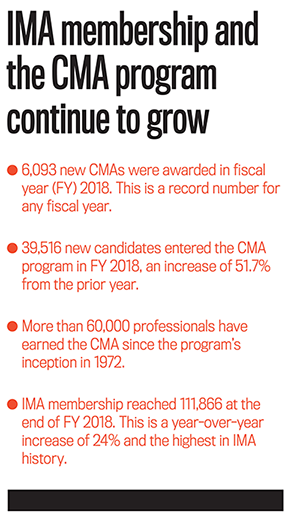As part of my role as senior office administrator for ICMA® (Institute of Certified Management Accountants), I’m privileged to be part of the team that is responsible for enhancing the careers of our CMA® (Certified Management Accountant) candidates. My main responsibility is reviewing educational documents for CMA hopefuls.
In order to become an official CMA credential holder, candidates must satisfy one of the following education requirements and submit verification of education to ICMA within seven years of passing Parts 1 and 2 of the CMA examination:
- A bachelor’s degree from an accredited college or university or
- An approved professional accounting certification.
You can find a list of approved certifications on IMA’s website, www.imanet.org. Click on the CMA Certification tab, and then go to the Getting Started section. Degrees that aren’t accredited must be evaluated by one of the independent agencies listed at www.aice-eval.org or www.naces.org/members.htm.
It’s interesting to evaluate the different types of educational documents that we receive from all over the world, some of which include pictures of our members. Seeing transcripts in different languages, which are translated into English, is truly fascinating and shows how global our membership is.
Another requirement for becoming a CMA is to complete two continuous years of professional experience in management accounting or financial management. This requirement may be completed prior to passing the examination or up to seven years after passing both parts.
Usually you must gain professional experience in full-time employment, but a continuous part-time position of at least 20 hours per week meets the definition of qualified experience and will count toward this requirement at a rate of one year of experience for every two years of part-time employment that you complete.
Qualifying experience consists of positions requiring you to make judgments regularly employing the principles of management accounting and financial management. Some examples of qualifying experience include:
- Preparation of financial statements
- Financial planning and analysis (FP&A)
- Monthly, quarterly, and year-end close
- Auditing (external or internal)
- Budget preparation and reporting
- Managing a general ledger
- Forecasting
- Company investment decision making
- Cost analysis
- Risk evaluation
Two years of teaching qualifies as related professional experience when it is full-time and at least 60% of the course load taught is either accounting or finance above the introductory level.
NEW REQUIREMENTS
Since IMA hired me in 2001, I’ve witnessed several significant changes in the CMA program. The exam curriculum has changed, and the exam is now offered in Chinese as well as English. We recently rolled out the CSCA® (Certified in Strategy and Competitive Analysis) credential for any active CMA or CFM® (Certified Financial Manager). The CSCA complements and expands upon the strategic planning and analysis skills developed through the CMA program.
In September 2016, IMA launched our first TV commercial advertising the CMA exam, which included the tagline: “You’ve got to earn it.” We followed that up with a robot-themed advertisement emphasizing the need to “be future-proof” in the accounting profession.
If you’re contemplating taking the CMA examination, don’t put it off. There are only five simple steps on your road to earning the certification:
- Enroll in the CMA program,
- Register for the exam,
- Study,
- Take and pass the exam, and
- Meet the educational and work experience requirements.
A DEDICATED STAFF
It’s fascinating to work in ICMA and watch how our exam development team creates the CMA exam from start to finish. I see firsthand the hard work we put into developing it. There’s a laser focus on quality so that our candidates get a fair and reliable exam. When candidates pass, I work with my colleagues to review the documents and help to complete the certification process for them.

Helping our CMA candidates is another important part of what I do. Assisting them with scheduling issues and addressing their concerns have been very rewarding. In addition, I prepare listings of awards and top scores, as well as congratulatory letters for our award winners, and I provide administrative assistance to Dennis Whitney, IMA’s senior vice president of certification, exams, and content integration. I also assist other staff as needed, for example, by setting up conference calls and meetings.
My journey with IMA’s ICMA team has been rewarding and fulfilling. This is why I put CMA first. So should you!

August 2018



